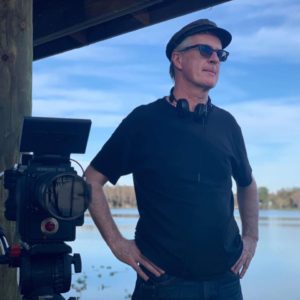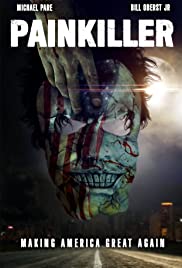Painkiller (read our review here), the new, deeply personal vigilante thriller, directed by Mark Savage and written by Savage and Tom Parnell, was released on DVD and VOD May 4, 2021. The revenge flick, an unofficial sequel to the writers’ previous Stressed to Kill, is about a broken father working through his grief by, in his own unique way, tackling the very sensitive opioid problem. I chatted with filmmaker Mark Savage about the sorrowful story behind the film, why he loves horror, and Bill Oberst, Jr. (read our interview with Bill and Tom Parnell here).

PopHorror: Hi Mark! How are you?
Mark Savage: Hey Tiffany! I’m good. How are you?
PopHorror: I’m good, thank you. Painkiller is a deeply personal story written by your friend and collaborator, Tom Parnell. Did you approach this production any differently because of the emotional weight attached to the script?
Mark Savage: We had made a couple of films together before while his son was still alive, so I was quite familiar with his son. I had met his Jordan a number of times, and we’d hung out with him, so I was quite close to him also. After we did Purgatory Road, we were thinking about what we’d like to do next, and I remember calling up Tom at one point and I said to him, “I’m not sure whether it’s too early to think about this, but do you think you’d like to do something that is somehow going to address the issue surrounding the death of Jordan?” And he said, “Let me think about this.” A couple of days later, he got back to me and he said, “You know something? I’d really like to address it in some way, but how are we going to do it? I don’t really just want to do a documentary. I don’t want to do something that’s too heavy handed.” And I said, “Well, why don’t we take the characters from an earlier film, Stressed to Kill, because there’s a character in that who has a daughter, so she could in a sense be a sort of proxy version of your son, and we’ll work it into a genre piece. But address the opioid issue.”
And he then went for that, and he was really keen to do that. The process was actually quite difficult for him, and because it was difficult for him, I had to be… There’s a lot of sensitivity in dealing with the subject matter because he was still very, very sensitive. It wasn’t long after his son had died that we started to write the movie. So our process was a little bit of a back and forth process, as that sometimes we’d talk about a scenario, so I would write the scenario, then I’d send it to him, and then he’d then start fleshing out some scenes, then I’d rewrite that. We kind of went back and forth. But I would say what was different with this one was that it was just very directly personal and painful, and I think the both of us sort of came out of our own frustration with reality.
What I think most people relate to is the pharmaceutical companies. They just have so much money, and they’re able to do a lot of what’s called—and we address it in the movie—something called “off-target marketing” where they’re marketing opioids to people who the opioids were not really intended for. You have a cancer doctor who, for example, might develop a drug and that drug that would save cancer patients. So that’s how it would get its approval. But then what the drug companies do, they go, “Oh, well we could also make money from doing this.” And what they do is they start marketing that cancer drug to people who don’t have cancer, for example, to people who have pain. The drug is so strong that they become addicted to it really fast. Technically, off-target marketing is actually illegal.
I guess it came out of a sense of helplessness, and Tom certainly felt very helpless when his son died. He was blaming himself, as you do when you lose someone who is close to you, and so I would say that as his friend first, I wanted to address his concerns and make sure that the production of the movie wasn’t too painful for him.

PopHorror: I can’t even imagine. I can’t imagine a time that would make it easier to address such an emotional and personal subject. I admire both of you being able to make a movie about it, especially with it being so recent.
Mark Savage: Tom felt that if he didn’t do it soon, if he didn’t do it closer to losing his son, then he felt that he might not be able to understand the exact feelings that he was feeling at that time. And I think we feel one of those feelings, which I think is very well articulated in the film. There’s a sequence where Bill [Oberst, Jr.]—as, in a sense, a proxy version of Tom—kills a number of people starting with the people who were in the trailer, and then there’s a montage of him killing people, and he’s talking about losing someone. And I think that sequence was definitely… The writing of that, I know, was the most painful thing for him when we were deciding how we were going to do that, because initially, we had a sequence where we had the montage of killings, but we didn’t have that voiceover.
And I remember at that time, I said to him, “You know what would be kind of interesting? Because I don’t want the film to just seem like at that point, it’s just a montage of killings. This would be the perfect opportunity to underline what’s behind the killings. So let’s actually literally have a voiceover of what it feels like to deal with grief.” That’s not going to take away the normal genre staple of having a murder montage, which you know in any genre film is a pretty steady thing. But in this one, let’s completely really emphasize that this film is really about dealing with loss. It’s about dealing with grief and also about dealing with helplessness in a way, because you’re sort of dealing with forces that, unfortunately for us all, forces that are beyond their control.
PopHorror: I know that both you and Tom worked with Bill previously on Stressed to Kill. So was it a natural choice then, for him to play the grieving vigilante in Painkiller?

Mark Savage: It seems fairly natural for us because at some point, we had always discussed that we wanted to do a sequel to Stressed to Kill because it’s sort of setting up a character who is dealing with, essentially, human indifference, people who are rude, things like that. People talking on cell phones in movies. This sort of standard stuff that on a daily basis makes us all very frustrated. It seemed normal to us to have that character of Bill because he does have a daughter in that movie, so it makes sense to have him worked into the plot there, that Bill has lost his daughter. And then, of course in the movie itself, and you probably noticed in the credits, that Tom plays the good doctor in Painkiller.
PopHorror: I did see that!
Mark Savage: He does have a small role in Stressed to Kill. He was the doctor who was encouraging Bill to deal with his stresses by eliminating them, which of course ended up eliminating the people who were causing those stresses. But ultimately, it didn’t make sense for us to have Tom as the character who loses his child, but it made sense for Bill because we had already introduced Bill as having a daughter, and she was a very positive character in the previous movie. And we didn’t necessarily want to do something that would be construed as a sequel to Stressed in Kill in name, because the film didn’t get the broad release that say like a studio film like Star Wars or Star Trek or something—you know those kinds of films get—which also beget a sequel. So that’s the reason we didn’t call it Stressed to Kill 2: Painkiller, because we didn’t want people to think, “I probably won’t see Painkiller, because I didn’t see the original movie.” So it made sense to do that.
But Bill was ideal for this role, because we love working with Bill. I think he’s absolutely one of the best actors out there, and I mean that amongst everybody. He’s absolutely a world class actor, and the fact that he hasn’t done studio-level films, to me, makes no difference in terms of his talent. I think he’s just an incredible actor. We both felt that Bill would be the ideal person that the audience would experience the grief through, because we certainly see the lead character in a movie like that. They’re essentially really good movie storyteller, and if you don’t relate, and you don’t want to go on the journey with that person, you’re not going to feel what they’re feeling, I think Bill’s very good at that. He’s very good at drawing you into his concerns, even when he plays a character that’s doing some evil or antisocial. He still helps you to relate to him. That was certainly important in choosing him in that role in the first place, because you’ve got a character who is killing people which, in the black and white sense, is a bad thing. But there’s a lot of grey areas, and the film’s about the grey areas, so that’s why our protagonist in Painkiller is himself a killer.
Our challenge was working to make the distinction between people who are killing for the wrong reasons and killing for the right reasons. At least in the context of a fantasy, not necessarily saying it would be the right thing to do in real life, but it at least gives the audience that catharsis. It is about that helplessness, so I think, in a sense, that’s what the film works as, a bit of a catharsis. When you feel helpless, that’s one of the reasons why I think we watch those kinds of movies. At least the issues addressed seem more reasonable rather than, for example, in real life where in a lot of these bigger drug companies, no one goes to jail. They usually just get a big fine which they don’t really have a problem paying. And they keep doing what they do. I thought Bill was actually the ideal, everyman kind kind of guy that people could relate to.

PopHorror: I agree. Big Bill fan here.
Mark Savage: That’s fantastic!
PopHorror: As a director, your filmography comfortably finds a home with fans of horror, thriller, and exploitation cinema. What is it about genre filmmaking that you find appealing?
Mark Savage: I certainly like watching those films, so I tend to make films that I would also want to see. I just find the genre is a really interesting way to explore human behavior. For example, say you’re doing a drama, more of a straight drama sort of like the Belgium filmmakers I like, the Dardenne brothers. I really like their movies. Their movies are more like straight dramas. You wouldn’t necessarily say they’re of the genre. In a sense to me, it’s sort of like an interesting picture frame. It’s almost like a picture frame whether it’s horror or an action or a western. That’s the picture frame you use to tell the human story. To me, if you’re telling whether it’s a horror or an action, you still explore the inconsistencies of the human beast, which I do find really inconsistent. You can explore human darkness all within that picture frame, so in a way, it’s still in a sense performing two functions. It’s entertaining, because you’ve got suspense. You’ve got the elements that we’re drawn to, especially as children. Like when you’re a kid and you watch those, you’re not necessarily watching for the deeper, dark, more substantial aspects. But I think that when you get older… I guess myself, I would say that when I watched a film like Valley of the Gwangi when I was a kid, I wasn’t seeing it necessarily as a struggle between people with different philosophies. I saw it as a dinosaur film.
I think then, as you get older, the genre becomes a really good window to entertain, and to some extent, explore themes. And with this one, it was really important for us, and this is why Tom and I both felt that we didn’t want to be really heavy-handed. We still wanted it to be an entertaining movie, but we felt that you can entertain and draw people in on the aspects of the suspense and the genre and the story line with what’s going on between the characters. It’s a better way to also start peppering it with what the opioid industry is doing and what the pharma industry is doing, but doing it without making it a very heavy-handed film. The genre becomes a very good way to somehow camouflage the message but still getting it through in a subversive kind of way.

PopHorror: One last question for you, Mark. What is your favorite scary movie?
Mark Savage: That’s a really hard question. I’ll try to give you an answer. Actually, I’m going to say one that’s probably not that well known. I won’t go for the super dark one, because one of my favorite super dark horror films is In a Glass Cage, a Spanish film. Amazing movie but that’s kind of disturbing on many, many levels. But I would say one of my favorite scary movies is Messiah of Evil, the American film.
Thank you so much, Mark, for taking the time to speak with us! Be sure to check out Painkiller on DVD and VOD now!

 PopHorror Let's Get Scared
PopHorror Let's Get Scared



